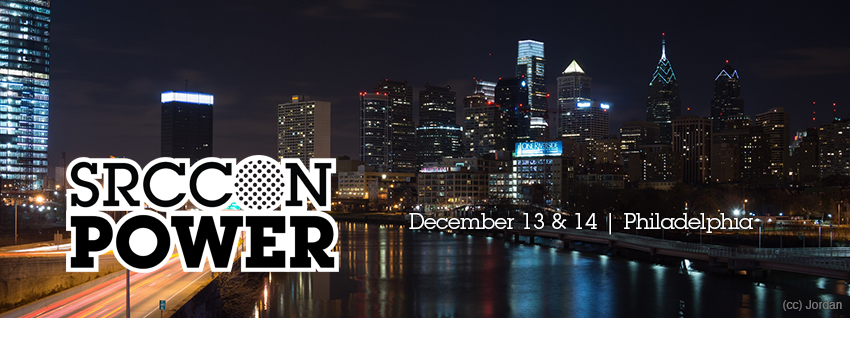Two days of tough conversations, some stumbles, and a lot of work ahead
by Erika Owens

We gathered in Philly for SRCCON:POWER.
Over the two days of SRCCON:POWER, I caught snippets of conversation about so many different dimensions of power dynamics in journalism and tech. Accountability for tech companies, systems of racial oppression, difficulties navigating power between different bosses and team members, how gender plays in. Given that wide range of topics, I also heard from folks that they came into the event and they didn’t really know what it was going to be about, but they knew they wanted to be there.
In planning, we intentionally left this space open for the participants to explore idea of power together. I’m so grateful to participants for trusting us to convene these conversations, and one another to get into such difficult and thorny topics. Many of the discussions went as we had hoped and planned, while others missed the mark. I want to share a bit of the initial feedback we’ve received and what’s ahead.
Structure, support, and planning
We organize SRCCON events with a lot of space for conversation and emergent ideas, and that is backed by a ton of prep and planning. As we’ve seen from prior events, folks appreciated a lot of our “standard SRCCON” offerings including a schedule with lots of breaks, a mix of sessions, a lack of emphasis on alcohol, accessibility supports including childcare and transcription, and, as one attendee put it: “THANK YOU FOR FOOD THAT IS NOT PIZZA!”
Several folks also mentioned that they appreciated the topical theme for this event including that the theme “meant everyone had some common interest, even if we had super different job titles.” Participants to this event were tied together by the fact that they were all working to shift power dynamics in journalism. One attendee mentioned, “in particular, I found this conference did a fantastic job of pushing difficult conversations in kind and supportive ways.”
With this shared grounding, we also put a lot of intention into helping folks think about takeaways from the event and how to keep the work and conversations moving forward after these two days. It’s been great to see ideas flowing in for ways we can support people’s work, and a bunch of notes about takeaways that are exactly what we hoped for—including:
- “There is a community in journalism that wants to reform power structures and it makes me feel heard and safe.”
- “Some strong connections with others in the industry I hadn’t gotten to know before, a plan for a write-up and a personal sense of obligation to use my own power more often!”
- “Great ideas and assurance that this work and more human-centered approaches matter.”
- “I took away real tools, frameworks and strategies for addressing the power dynamic in my newsroom and in journalism.”
In addition to feedback from our anonymous attendee survey, several attendees took to Twitter to share their thoughts as well. Reactions such as:
- “I met so many awesome people with amazing ideas to help transform news media and to make it more inclusive, informed and empowered.” - @katbee
- “At this moment in my career #SRCCONPOWER was a godsend.” - @thejefflarson
- “Lots of meaningful discussions and so many ideas to bring back to @Reveal.” - @achabel
- “Thank you for making #srcconpower amazing. I’m bringing your values and spirit home with me.” - @wmariano
- “thank you @erika_owens @source & my new pals from #SRCCONPOWER for holding space, sharing and listening” - @chenkx
- “My first thought is that this was the best @SRCCON yet.” - @britrenee_
- “Thank you @SRCCON #SRCCONPOWER for having me and feeding my soul!” - @webjournalist
- “#SRCCONPOWER hands down the best conference I’ve ever been to. Thank you for making time & space for these conversations about power” - @mandicai
- “So inspired by the people I met at #SRCCONPOWER and also renewed in my energy around transforming journalism.” - @LewisPants
- “#SRCCONPOWER is seriously the best conference I’ve ever been to!” - @kathryncasteel
- “#SRCCONPOWER was an incredible experience and I am better for it.” - @dataeditor
- “#SRCCONPOWER flew by way too fast but I’m feeling so invigorated and excited about what I’ve learned from so many great folks.” - @ldixon_3
These comments and others show how important it is to create spaces like this for folks to connect, reflect, and recharge. And we’ve got a bunch of resources on our site about how we plan these human-focused events, plus we’re available for consulting to help other organizations with any aspect about this type of planning!
Areas of improvement
The processes and structure we have for SRCCON events have been developed over five years of experimentation and feedback. We still have a lot of room to grow, and I am so grateful to participants for the depth of their feedback and letting us know when we’ve made a misstep. In our feedback form, we asked about what could have been better, and we got a few notes about small adjustments to timing, food, and programming, which we’ll incorporate into future events. We also received notes about one aspect of the event that I’d like to respond to in more depth.
This year, I organized our talks program. After reaching out to a bunch of community members for suggestions, I invited folks with a range of expertise on different dimensions of power, journalism, and tech. I was excited for these speakers to share research and experience that could inform the conversations throughout the conference, with longer talks providing time to really reflect on what they were sharing.
Most of the talks fit with this expectation, but one did not. A talk that was meant as an open conversation to explore how we as journalists cover ourselves, including the accountability, history, and power dynamics that we had been discussing throughout the event, did not present that way from the stage. As one attendee put it, the talk “felt a bit forced/out of sync with the rest of the conference,” which was a feeling echoed by other attendees.
In retrospect, I didn’t effectively work with the presenters of that talk, which led to confusion for speakers and audience alike, and for that I apologize. One attendee told me it was a conversation that would have fit right in at other conferences, or even SRCCON 2014—but that this community has evolved from conversations about diversity to conversations about equity and dismantling white supremacy. I’m reflecting on how not to make a decision like this again, and helpfully, there are already suggestions in our feedback form about how to do better.
To me, part of our work is being willing to continue engaging with difficult discussions even when they may not always go as intended—while also taking steps to mitigate risk and learn from missteps. One attendee shared, “I think what worked well about [this talk] were the speaker’s respect for the questions they received from the audience after the talks. … It proves that it is possible for those with privilege to show humility after sharing statements that expose blind spots.”
We’re still gathering feedback from attendees and look forward to a full review of these notes and more in the new year. Much thanks to everyone who has shared their thoughts, questions, concerns, critiques, and other feedback during the event and after.
What’s next
As many of you have suggested, we will be getting some rest after organizing this event! In the new year, we’ve got a bunch of plans for following up on ideas coming out of sessions. Source will have ample write-ups and space for documentation and continued conversation. We’ve also already set the date and location for SRCCON 2019: We’ll be back in Minneapolis on July 11-12.
Newsrooms are super skilled in productive conflict when it comes to the reporting and editing process. There are fewer spaces to have conversations about the legacy of racism in our reporting and institutions, and how newsroom structures and reporting perpetuate inequitable power dynamics. At SRCCON:POWER, we had more than 100 people willing to get into those kinds of questions, to envision what equitable workplaces can look like, newsrooms with inclusive, respectful relationship with community, and maybe a more skeptical orientation toward technology companies. We heard from a few participants that this event with its topical focus and emphasis on outcomes was their favorite SRCCON yet. As one attendee put it, “I appreciate the tangible takeaways. There were a few sessions where I found myself thinking: ‘Huh, this is something I’ve spent a lot of brain energy on, but I don’t think I’ve ever once tried to map it out on paper.’”
Attendees left with maps on how to tackle aspects of work shifting power dynamics, together with a network that shares these values and won’t (fully) rest till we have representative, inclusive, functional journalism institutions.
The latest from the OpenNews team
Our next step in community-driven leadership: an Advisory Council
Read all our news in our OpenNews blog

